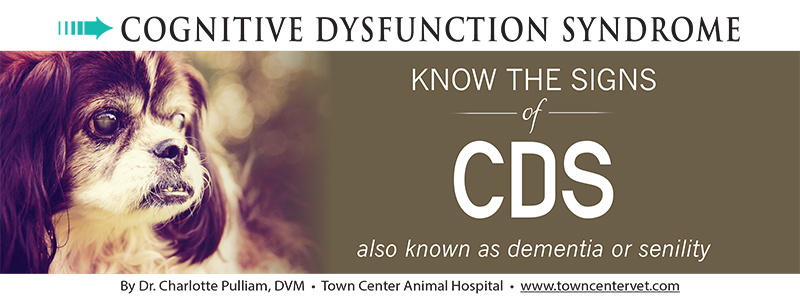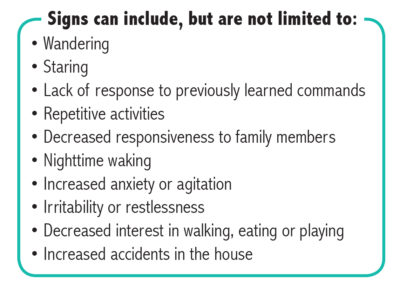
Getting older is hard for all of us, but especially hard for our four-legged friends. Cognitive dysfunction syndrome (CDS or also known as dementia or senility) is a degenerative disorder characterized by gradual, progressive signs due to brain atrophy and the secondary effects of this atrophy. When the brain atrophies, the size of the brain decreases, and in turn we can see a decrease in brain function.
Another change that occurs with CDS involves a neurotoxic protein, called beta amyloid. Beta amyloid can accumulate in the brain, damage the neurons (a nerve cell that is the basic building block of the nerve system), and can directly increase cognitive impairment. Other changes that can occur with age are decreases in dopamine levels and even small infarcts (a place where the blood flow has been stopped or interrupted).
Common clinical signs can be gradual, very non-specific, and making it a hard condition to diagnose. Typical age of onset is usually in patients older than 11 years, but sometimes can be seen as early as 7 years old. There is no known sex or breed predilection.
 Since these signs can be so non-specific, a thorough senior wellness exam is recommended prior to diagnosis to rule out any other diseases which can also have similar clinical signs. It is very important to rule out physical causes of pain and anxiety, and other abnormalities such as elevated blood pressure, metabolic and hormonal disorders, drug reactions, systemic infections, and brain cancer that can mimic signs of CDS.
Since these signs can be so non-specific, a thorough senior wellness exam is recommended prior to diagnosis to rule out any other diseases which can also have similar clinical signs. It is very important to rule out physical causes of pain and anxiety, and other abnormalities such as elevated blood pressure, metabolic and hormonal disorders, drug reactions, systemic infections, and brain cancer that can mimic signs of CDS.
Many therapies have been documented in assisting with slowing cognitive dysfunction, but the best success is with a multi-modal approach. Medications such as selegiline or SAM-e can be beneficial, especially selegilinie as it can directly increase dopamine levels.
Diets high in antioxidants can also be very beneficial, as they can minimize the production of free radicals. Antioxidants even have the ability to decrease amyloid in the brain. Environmental enrichment can also be very beneficial, including introducing new toys and even playing with other dogs.
Other treatments that may be useful, but are still being studied are:
- Anti-inflammatories – may help with inflammatory changes that can accompany CDS
- Melatonin, dog-appeasing pheromone (DAP), ginkgo biloba, or DHA (an omega 3 fatty acid) may be helpful to reduce anxiety and aid in the benefits of concurrent therapies
With any of these treatments, it is very important to consult your veterinarian to get a safe treatment plan designed just for your pet, as many medications or holistic treatments can be harmful.
Unfortunately, there is no cure for cognitive dysfunction, just the previously mentioned therapeutic approaches to improve cognitive function or at the very least slow the progression of the disease. The prognosis is not too bad, as dogs diagnosed tend to live a full lifespan.
By Dr. Charlotte Pulliam, DVM • Town Center Animal Hospital • www.towncentervet.com
